Since her arrival in Los Angeles in 2002, Shannon Warne has become one of Southern California’s best and busiest musical theater leading ladies, with recent roles in the Pasadena Playhouse production of Camelot, Musical Theatre West’s Annie, and the Cabrillo Music Theatre 2010 Holiday Spectacular winning her rave reviews and audience cheers. Her one-night-only performance in the title role in Jeanine Tesori and Brian Crawley’s Violet (for Musical Theatre Guild) garnered her a 2008-2009 Scenie for Musical Theater Performance Of The Year. We caught up with Shannon mid-rehearsal for International City Theatre’s upcoming West Coast Premiere of Stephen Flaherty’s Loving Repeating to find out how the Upper Midwest native has gone on to a successful musical theater career in the City Of The Angels.
Shannon, you grew up in the quiet Twin Cities’ suburb of Maple Grove, Minnesota, and made your first theater appearance in My Fair Lady at the age of seven. What was it that got you on that stage at such a young age?
I remember very distinctly knowing by the time I was four or five years old that I wanted to sing and act professionally. I used to watch The Wizard of Oz and even at such a young age I had worked out not that I wanted to be Dorothy but that I wanted to be the girl who got to pretend to be Dorothy.
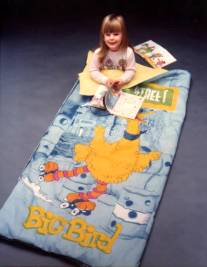
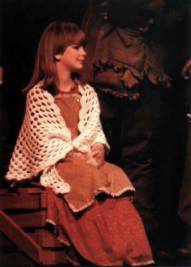
Shannon’s first modeling job, and her musical theater debut in My Fair Lady
Did you get taken to the theater at an early age?
I don’t remember attending a lot of theater that early on, but when I began singing publicly for school recitals and assemblies it was clear to everyone that I was enthusiastic about performing. When I was around seven years old my music teacher asked me if I’d be interested in taking part in the high school production of My Fair Lady. After that experience, which I still remember so vividly, that was it for me! I knew musical theater was what I had to do with my life.
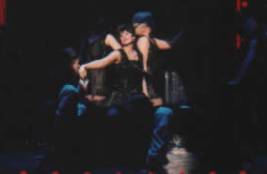
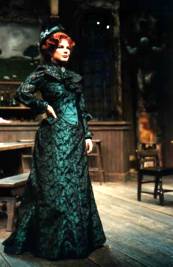
As Sally in Cabaret and as Suzanne in Picasso At The Lapin Agile

As Puck in A Midsummer Night’s Dream
You graduated with a B.A. in Performing Arts from Minnesota State University, Moorhead, then began your professional career in Minneapolis. Are there any productions or roles from those early years that stand out in your memory?
I was fortunate to be cast is a wide variety of roles during my time at MSUM in both musicals and straight plays. The ones I remember most fondly were Sally Bowles in Cabaret, Mabel in The Pirates of Penzance, Suzanne in Picasso at the Lapin Agile, and Puck in A Midsummer Night’s Dream. I was new to the department when I was cast as Sally. It was incredibly intimidating to land such a monster of a role as a first year student. There were a lot of upper-classmen who were not so happy about someone so new and so young being cast, so I felt a great deal of pressure to prove myself. It was an enormous challenge and I grew a lot during that show.
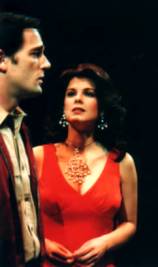
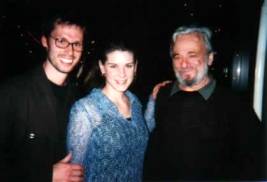
With Ken Barnett in Merrily We Roll Along, and with Tom Musgrove and Stephen Sondheim after the performance
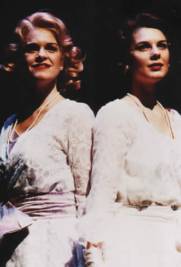
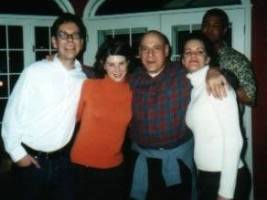
With Kersten Rodeau in Side Show, and with Bill Russell, Henry Krieger, and Keri Rodeau (Esera Tuaolo in back)
And after graduation?
Once I graduated, I was blessed to work in some of the best theaters in Twin Cities. I worked with the Guthrie Theatre on Merrily We Roll Along where I met and had dinner with Steven Sondheim after he attended the production. I was cast as Violet in the Midwest premiere of Side Show, directed by the book writer and lyricist Bill Russell. Henry Krieger attended closing night and even joined us for karaoke afterward! Right before I moved to Los Angeles I played Hope in Anything Goes! at the Ordway in St. Paul. The cast consisted of Sandy Duncan, Jim Walton, Tari Kelly, and more.
Any chance you’ll do more stage work back on your home turf?
The theater scene in Minneapolis is so rich and is so well supported by the community. I look forward to working there again someday.
Many musical theater majors make the move to New York as soon as they’ve graduated, or accumulated a few local credits, yet you left the Upper Midwest for Southern California. Other than a warmer climate, what influenced your decision to move west and not east?
I’ve always pursued theater but my husband [actor Tom Musgrave] preferred film and television. We both loved living and working in Minneapolis, but we knew after a couple of years that we were interested in moving to a bigger market. He flew to Los Angeles for pilot season one year and immediately landed a recurring role on a sitcom. We decided to take the leap and make the move out West. I was thrilled by the amount of opportunities here. People often assume that New York is the only place to have a career in musical theater. I’m happy to disagree. That being said, of course I would loveto live and work in New York on Broadway. I believe I will someday when the timing and circumstances are right. For now, I’m happy to be in L.A.
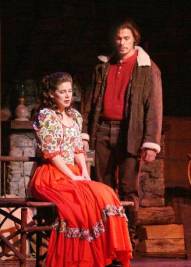
With Stuart Ambrose in Seven Brides For Seven Brothers
What would you consider your first big break after relocating to L.A.?
I was involved in a lot of great projects in my first few years in Los Angeles, but I really feel things “broke” for me when I was cast as Milly in Seven Brides for Seven Brothers with Cabrillo Music Theatre. That role was my first major lead in a big house in L.A. and my career really gained momentum with that show. Not only was it a fun role but so many things about that particular project were special for me.
For example?
[CMT Artistic Director] Lewis Wilkenfeld and I had been friends for a number of years and he had been a huge supporter of my career, attending nearly everything I was in. We’d been waiting for the right project to come along so that we could work together and Seven Brides was the right fit. Also, my costar in the show was one of my favorite people on the planet, Stuart Ambrose. We have so much fun working together and at the time, he had made the decision that Seven Brides was going to be his last show so that he could pursue his other passion, politics. It meant a lot for me to get to share that time with him. Another factor was that the show came to me at a time when I was feeling a bit burned out from having been on tour. Camelot was a wonderful project to be a part of, but traveling took its toll on me. The cast, crew and experience of Seven Brides were so wonderful, they were an important reminder to me why I love to do what I do.
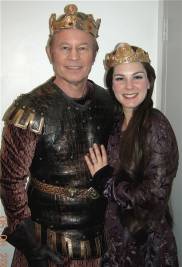
As Guenevere opposite Michael York
Backtracking a bit, 2007 was a big year for you as you toured the United States in Camelot, starring Michael York, Rachel York, and James Barbour. In addition to performing the role of Nimue, you covered the role of Guenevere and got to perform it a half dozen times, including an Opening Night in Philadelphia. What was the touring experience like for you?
Being a part of the Camelot tour was incredible experience for me. I learned a lot, of course, about traveling and building the stamina to perform eight shows a week for months at a time, but I think most importantly I learned a lot about myself. At the time I had a need for routine and order, two things that do not necessarily go hand-in-hand with touring, so I had to find ways of being flexible and letting go. It was a great growth experience for me.
How did it feel stepping into a starring role on a big city opening night?
The big plus of the tour was indeed going on in the role of Guenevere. Rachel was very generous and provided me many opportunities, the biggest of course being Opening Night in Philly. I was thankful that I had performed the role so many times before, so I was already comfortable doing it. An additional payoff was that I came home from tour with favorable reviews of my performance from influential East Coast reviewers.
Since I “discovered” you in Cabrillo Music Theatre’s production of Seven Brides For Seven Brothers, you have become that oxymoron—a Los Angeles-based musical theater leading lady, working almost constantly since then. Admittedly, you did take off for a brief maternity leave in 2008, but the birth announcements for had hardly been sent when you returned to the musical stage svelte as ever only a few months after Jack was born. Do you ever pinch yourself for how blessed you are as a musical theater performer?
Every day! I am incredibly blessed to get to do what I love and have the opportunities I have as often as I have them. I am deeply, deeply grateful!
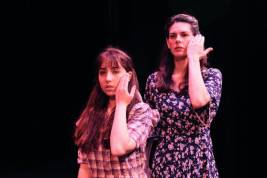
As Violet (with Maggie Hecht-Herskowitz as Young Violet)
StageSceneLA awarded you Musical Theater Performance Of The Year for your work playing the title role in Musical Theatre Guild’s Violet—a one-night-only production and performance. What was it about this musical, and about the role of Violet, that got you to dig so deep and touch so many hearts that very special night?
Violet was such a remarkable project to be a part of. Working with [director] Richard Israel, the rest of the creative team and such an incredibly talented cast was a major highlight of my career. I think what is truly special about Violet is that the show is about making peace within one’s self. So many women’s roles in musical theater follow the same basic pattern—she falls in love, there’s a misunderstanding, they work it out, they live happily ever after. In Violet, the character is required to dig to the depths of herself, face her biggest demons, make her peace within, and only then can she live a happy existence. The reason I know it resonates so much with me and, I suspect, with others is that it is so relatable. We all have our demons, our skeletons, our “scars” and it’s easy to spend our lives trying to ignore them so we don’t have to deal with them. The character of Violet sets a remarkable example.
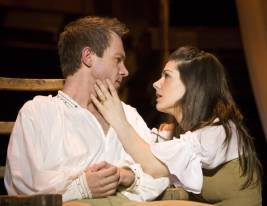
With Shannon’s second Arthur, Shannon Stoeke, in Camelot
About a year ago, you were winding up a much lauded run in David Lee’s revolutionary re-envisioning of Camelot at the Pasadena Playhouse. Did the touring production prepare you at all for playing Guenevere full-time, or did you take a start-from-scratch approach to the role?
We pretty much started from scratch. The first day we began blocking it became very clear that this was going to be a much different interpretation of the character. One of the challenges of understudying a role is that your job is to recreate the character as closely as possible to the way it is done nightly. You don’t have the luxury of putting your own spin on it. What was wonderful about doing the Pasadena production was that the character was developed based on my impulses and my instincts in collaboration with David’s over-all vision.
David’s Camelot was so brilliant that I’ve pretty much vowed never to see a traditional Camelot again. What do you think made this scaled-down Camelot so extraordinary?
What I loved about David’s version is that it not only got to the heart of the story, which is the love triangle, but it stripped away the usual pomp and pageantry that I think can keep the audience at a distance. David broke the story down in a way that helped the audience to identify with each of the characters on a very personal level and encouraged them to put themselves in our shoes.
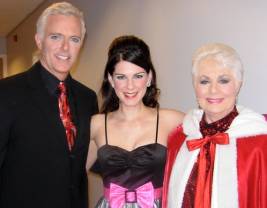
With Patrick Cassidy and Shirley Jones
Most recently, you costarred with Shirley Jones in the Cabrillo 2010 Holiday Spectacular. Did you get a chance to talk with Miss Jones about her legendary career as a musical theater leading lady?
Shirley has wonderful stories! My favorite is the one she tells about how she got her start in the business. The pared-down version is that she went to an open-call for a Rogers and Hammerstein show and even though she’d never auditioned for anything before, let alone performed in anything, she ended up during that audition singing for both Rogers and Hammerstein on stage with the City Center Symphony and was cast in South Pacific. Less than a year later she was starring in the movie Oklahoma! Her version is much more detailed and very funny, but that is the amazing gist of it.
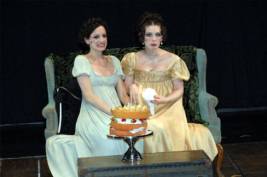
As Polly (opposite Rachel Genevieve) in ICT’s The Threepenny Opera
The upcoming production of Loving Repeating marks your return to Long Beach’s International City Theatre, L.A.’s unsung gem of a midsized regional theater. I’ve heard so many great things about ICT from people who’ve worked there, and with the Desais. Was getting to return to ICT a factor in your pursuing the role of Gertrude Stein in Stephen Flaherty and Frank Galati’s chamber musical about Stein’s life?
I have had such a wonderful time working with caryn desai on Loving Repeating. She is a lovely woman who is a very nurturing, collaborative director. This is a very challenging piece and I deeply appreciate having her support and encouragement.
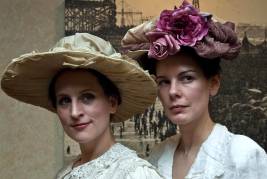
As Gertrude Stein in Loving Repeating, with Melissa Lyons Caldretti (l.) as Alice B. Toklas
Composer Flaherty is famous for his many musicals with Lynn Ahrens as lyricist, yet here the lyrics are by Gertrude Stein herself, and the show is adapted from a lecture Stein gave in the 1930s, making it quite a unique show, correct? What can you tell us about Loving Repeating, about its plot, characters, and songs, and about what drew you to the piece?
This IS a unique show; you are correct! Loving Repeating is a retelling of the relationship of Gertrude Stein and Alice B. Toklas using only Gertrude’s words. Anyone who’s familiar with Gertrude Stein’s work can imagine what a challenge this presents due to the fact that she used a great deal of repeating, unconventional grammar, and in some cases she just plain made words up. To be perfectly honest, I wasn’t sure I was right for the role. In many ways it is very different from those I usually play. As I listened to the music and learned more about Gertrude Stein, I became more and more excited to take her on. The music is beautiful and Gertrude provides such fascinating imagery and movement with her poetry.
Tell us more about the Gertrude Stein we meet in Loving Repeating.
Gertrude was a very hearty, grounded, intelligent woman who was fascinated by other people and what made them who they were. She spent her life making observations about the people around her and the people they surrounded themselves with. She felt that the key to understanding others was to take note of how they would say and do the same thing “over and over again with infinite variations but over and over again.” Alice B. was Gertrude’s faithful “wife” and was instrumental in her success, both as a poet and as a woman.
I understand that you’re sharing the role of Gertrude with Cheryl David.
Yes. In Loving Repeating there are two Gertrudes: older Gertrude Cheryl guides the audience through her history, using the speech that was given while she toured in the 1930’s. She pops in and out of musical numbers, comments on the action and takes over for her younger self at the end of the show. I play Young Gertrude, representing her from age 19 through her early 50s.
Has the role of Gertrude presented any particular challenges for you?
The biggest challenges for me have been a combination of trying to embody such a distinct, remarkable woman, honoring the original intentions of her work, and making sense of lyrics that in many cases are not meant to be understood in a conventional way, all while telling a clear story. One thing that every audience member should know when coming to see this piece: a Cow is an orgasm. That is key!
I’ll keep that in mind when I see the show! How much research have you done into Gertrude Stein’s life in preparation for the role?
I love doing research and having such a remarkable historic figure to learn about has been thrilling for me! What is wonderfully helpful about her is that she loved writing about herself. She wrote a book entitled: The Autobiography of Alice B. Toklas which was intended to be about her life partner Alice, but is almost entirely about herself from “Alice’s” perspective. I’m so fascinated by her confidence, her ability to say exactly what was on her mind even if it was not pleasant and, in spite of that, be deeply loved by her many friends. She insisted on living her life the way she wanted to live it. She never held a job besides writing, she spent most of her life living with her “wife” Alice at a time when that kind of life was not accepted, and even though she was Jewish and gay, she somehow managed to escape persecution during WWII. She loved art and literature. Her closest friends were Picasso, Matisse, Cezanne, T.S. Elliot, Hemmingway, the list goes on and on. She and Alice were deeply in love with one another until Gertrude died in 1946. I hope that seeing this piece inspires our audience to learn more about these remarkable women.
Jack must be about two years old, right? What’s your secret for combining marriage, motherhood, and a career?
I am so blessed. I could not do what I do without the incredible amount of support that I get from home and from friends who help fill in the cracks. When I’m working on a show I have so little time to spend with my family. It’s very difficult for all of us and quite honestly sometimes I don’t balance things quite right. We’re learning as we go. I feel so blessed that Tom has been willing to sacrifice his time and his other priorities so that I can pursue my career. Jack does well considering everything. Tech week is the toughest time because that is when I am gone the most, but he is finally at the age where I have started bringing him to sitzprobes* and dress rehearsals. He attended the Holiday show this year and watched me in a performance for the first time. I was so thrilled to have him there I cried.
And does Jack show any signs of following into his parents’ footsteps as an actor?
We could see from the time he was very young that he was drawn to music and dance. We always joke that we’re going to send him to veterinary school, but if he decides to follow in our footsteps, we’ll be his biggest supporters!
One more question. Shirley Jones broke out of her musical leading lady role when she won the Oscar for her dramatic turn in Elmer Gantry. Do you ever get the itch to go dramatic, or at least to do a non-singing role?
I would loveto do straight plays, both comedic and dramatic. I did a lot of work in straight plays in college but for some reason I have yet to be seen for any here in L.A. I’ve also been thinking more seriously about trying my hand at film and television. My passion has always been for live theater, but it seems silly to be living in L.A. and not auditioning for on-camera work.
A lot of other L.A.-based musical theater performers are doing just that, so I’ll keep my eye out for you on the big and small screens in the years to come. Thanks so much, Shannon, for taking time to answer so many questions! I know how busy you are!
Thanks so much Steven for your interest and support!
*From Wikipedia: Sitzprobe (German) is a term used in opera and musical theatre to describe a seated rehearsal where the singers sing with the orchestra, focusing attention on integrating the two groups. It is often the first rehearsal where the orchestra and singers rehearse together.
Click here to purchase tickets for Loving Repeating

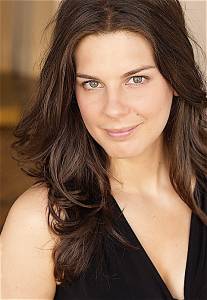

 Since 2007, Steven Stanley's StageSceneLA.com has spotlighted the best in Southern California theater via reviews, interviews, and its annual StageSceneLA Scenies.
Since 2007, Steven Stanley's StageSceneLA.com has spotlighted the best in Southern California theater via reviews, interviews, and its annual StageSceneLA Scenies.







 COPYRIGHT 2025 STEVEN STANLEY :: DESIGN BY
COPYRIGHT 2025 STEVEN STANLEY :: DESIGN BY